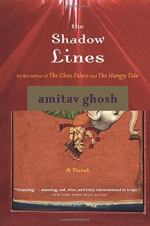|
This section contains 1,977 words (approx. 7 pages at 300 words per page) |

|
SOURCE: “Life on the Edge,” in New Republic, Vol. 201, No. 6, August 7–14, 1989, pp. 37–39.
In the following positive review, Klinkenborg expresses admiration for Ghosh's ability to capture the essence of human emotions and relationships in The Shadow Lines.
Halfway through Amitav Ghosh's new novel, The Shadow Lines, the narrator says, “I no longer existed, but as a chronicle.” That is a striking statement, a testament of personal extinction before one's story, the tacit confession of every omniscient narrator. In this novel, it implies the ability to repose on language as if it were a hammock, to trust the way its weave keeps one's haunches off the ground. It implies certitude, competence, judgment, meaning—all the trappings of what the narrator calls his “tidy, late-bourgeois world,” whose genteel borders are rigorously defended against India's seething masses. To reduce (or enlarge) oneself to a chronicle demands the balance needed for the kind...
|
This section contains 1,977 words (approx. 7 pages at 300 words per page) |

|


